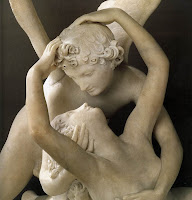"He has clothed me...He has covered me...like a bridegroom...like a bride...." Is. 61:10-11
 |
| Love is the key. (Get it?) |
Isaiah's metaphor for our new identity and function point us to something in addition to that purpose and function: our purpose and function are not simply a matter of duty. Remember, he
could have used any metaphor he wanted. His word choices prove that:
"decks" means "to meditate" and carries the image of church service as
well as a wedding, and "jewels" means any prearranged thing, even the garb and tools of a worker going to work. Yet he did not use those images, images of duty and work. He chose instead the images of a bride and groom, images of love.
 |
| You missed a spot. |
Now, it is true that a bride and groom have a duty to give, both in the wedding and in the marriage. But that exception only proves the rule: we expect them to fulfill their duty because we assume that they love each other and will gladly give their best to each other. If they failed or deliberately faltered in their duty towards each other, we would feel a sense of disappointment. However, if they did their duty only out of duty and nothing more, then we would feel the same thing. We would feel as if something had been missed, left out. The situation suggested and called for more than mere dutifulness or efficiency. It called for love, a much deeper and solid thing. Love is the only sure foundation for dutiful action, because it alone can keep the fires burning for years to come.
 |
| As we adore... |
Just as a bride and groom have an identity and function out of love, so too do those whom God has redeemed. Their purpose and function is done out of love, because it came from love. It was Love that redeemed totally and absolutely (John 3:16; Rom. 5:6-11; I John 4:7-10). He wrapped His people in salvation and righteousness just like a groom is decked out for his bride (and vice versa). The groom decks himself (or is decked) out of love for the bride, and because of that love he is decked in his finest, in all that makes the bride happy. Likewise the bride adorns (or is adorned) out of love for the groom, and because of that love she adorns herself with beauty, with all that makes the groom happy. Every action belongs to love. It is a mutual reception of joy, each giving to and receiving from each other out of love for each other. That is the image Isaiah is going for, that God is going for through him. God has decked His people out in the best that He has: a salvation and righteousness all-encompassing and overwhelming. And as He has given His best out of love, so too His people give back their best out of love. To do it for any lesser or other reason would be a corruption of the whole relationship.
 |
| ...so too we adore. |
This is where all the "relational" language comes from in Christianity. Having a "relationship" with God may be an overused and abused idea, but it is still the closest to the truth. We were made to love God, saved to love God, and we can only love Him the same way we come to love anyone else: we must begin to know Him. Such knowledge is only possible through His self-disclosed revelations: Nature (Ps. 19:1-4; Rom. 1:19-20) and Natural Law (Rom. 2:12-15), as well as His word (II Tim. 3:16; Heb. 4:12) and Word (Heb. 1:1-4). We must learn who He is and what He loves. We must learn to listen to Him, talk to Him, and spend time with Him. If we are to love God, then we must know God, and if we are to know God, then we must immerse ourselves in His revelations. Spend your time amongst Nature and its beauty. Spend your time studying virtue and truth. Above all, spend your time in His word, learning from His Spirit (I Cor. 2:6-12) and His Son. From that soil your knowledge will grow, and from that your love will grow, and from that and that alone will your activity grow, for truth is the foundation of love, and love is the foundation of life.
-Jon Vowell (c) 2013













No comments:
Post a Comment